HOME / ABOUT SHAW / The Beginning 1924-1933
The Beginning 1924-1933
The Beginning
The Shaw Organisation was founded in 1924 when the late Tan Sri Runme Shaw (1901-1985) arrived in Singapore from Ningbo, Shanghai. He was the third of seven children of a Shanghai textile merchant, Shaw Yuh Hsuen (1867-1920).
(Click here for more ancestry details.)
(Click here for more ancestry details.)
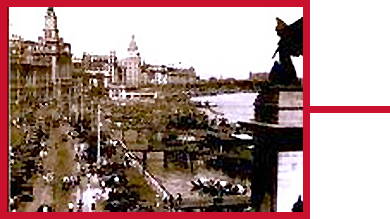
Shanghai, China 1920
In Shanghai, Runme and his brothers owned a film company known as Unique Film Productions (aka Tian Yi Film Co) where they produced 'silent films'. Not satisfied with their domestic market, the brothers wanted to seek
business opportunities elsewhere, especially South-East Asia. Runme, as distribution manager was given this task. Originally. Runme's destination was indochina where he hoped to meet with the film distributors. But as fate
would have it, he was denied permission to land there. Instead, he ended up in Singapore. Two years later, he was joined by his sixth brother Sir Run Run Shaw (1907-).
Shaw Films, The Silent Era 1920-30
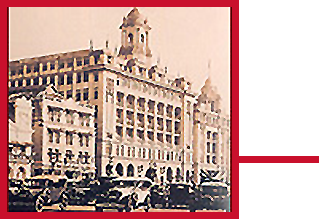
Beach Road Hotels, Singapore 1925
Collyer Quay, Singapore 1924
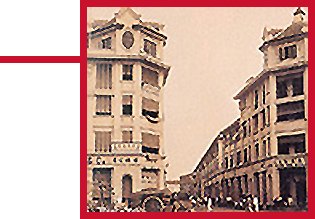
The first movies in Malaya were 'silent' films - one of the reasons they could be understood by the many dialect groups in Singapore at the time. So whether you were Hokkien, Teochew, Cantonese, Hainanese, Hakka or even Shanghainese, 'silent' films all sounded the same.
These became an instant hit to the entertainment-starved masses of Singapore.
These became an instant hit to the entertainment-starved masses of Singapore.
But for new arrivals like Runme and soon after, Run Run, finding distributors and exhibitors for their brand of 'silent' movies proved a hurdle. As Shanghainese, they found themselves locked out of the highly protected market by the dominant dialect factions - Cantonese, Hokkien and Teochew - who controlled local film business. It was believed that these businessmen imported films from China directly and
showed them in their cinemas. Very few wanted to release Shaw 'silent' films. Complication matters further was an alliance struck by a major exhibition circuit run by Malayan an cinema king Wang Yu Ting with Shanghai's Liuhe Film Company, a cartel boycotting Shaw films. Undaunted by the opposition and prejudice, both brothers struggled to carve out market share for themselves.
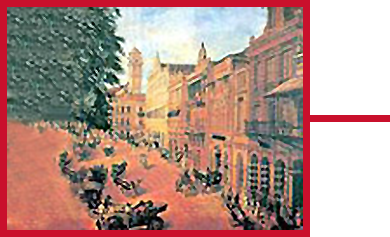
Street of Singapore, mid-1920s
By 1927, they began operating their own 'proper' cinema in the Tanjong Pagar district. This first make-shift wooden cinema was known as The Empire. It as sub-leased from a Mr Koong at the then enormous rent of $2000 monthly. In fact, they had originally tried to distribute their films into The Empire but was rejected as the
cinema only showed American silent films. Now as proud managers of their own exhibition hall, the brothers charged 50 cents for the hard benches in front and 75 cents for the wooden chairs at back (Patrons were asked to bring their own cushions). The silent films were then projected onto a normal cloth hung from the ceiling.
During screening, individual musicians - usually pianists - were hired to accompany the action. These were not only to provide dramatic effects but also to mask the noise from projectors and the audience. Only two evening shows were screened per day.
Unique Film Productions, Shanghai
Unique Film Productions was founded in Shanghai by the brothers in 1924 - four years after their father's death. The company was at first located on the narrow Donghengbin Road in Shanghai but increasing output demanded more space. It was eventually moved to the 68 Huade Road.
Operations at Unique Film Productions was headed by the eldest of the Shaw brothers, Runje (1896 - 1975). The company was founded on a capital of $50,000 and Runde was appointed as accountant and screenwriter while Runme was the distribution manager. Runje, as general manager, never left China and continued making movies there until the Communist Revolution.
Prior to film business, Runje was a gifted lawyer (in the Shanghai district court and joint hearing office) with a successful career that included managerial positions at both Hsin Hwa Foreign Firm and the prestigious Chinese-French Chen Ye Bank.
His entrepreneural streak was evident from the various business 'sidelines' which he got himself involved in. One successful venture included the Huayou Egg Factory which had branches in both Ningbo and Tianjin. But his passion lay more with the performance arts. As a hobby, the multi-talented Runje was already writing plays for home grown opera theatres in Shanghai.
Operations at Unique Film Productions was headed by the eldest of the Shaw brothers, Runje (1896 - 1975). The company was founded on a capital of $50,000 and Runde was appointed as accountant and screenwriter while Runme was the distribution manager. Runje, as general manager, never left China and continued making movies there until the Communist Revolution.
Prior to film business, Runje was a gifted lawyer (in the Shanghai district court and joint hearing office) with a successful career that included managerial positions at both Hsin Hwa Foreign Firm and the prestigious Chinese-French Chen Ye Bank.
His entrepreneural streak was evident from the various business 'sidelines' which he got himself involved in. One successful venture included the Huayou Egg Factory which had branches in both Ningbo and Tianjin. But his passion lay more with the performance arts. As a hobby, the multi-talented Runje was already writing plays for home grown opera theatres in Shanghai.
Runje Shaw and family
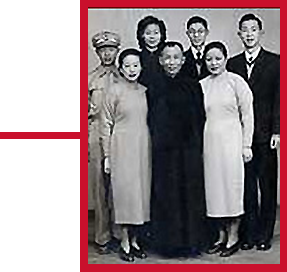
Later, together with his brothers, Runje acquired an opera theatre - The Laughter Theatre (1923) - and began operations, more for pleasure than anything else. The success of this theatre spawned two more - The Hsiang Theatre and Hangzhou Popular Theatre in 1928.
In fact, the first 'silent' film produced, distributed and exhibited by the Shaws was an adaption of one of Runje's more popular plays at The Laughter Theatre - 'The Man From Shensi'
This play, with a rough Robin Hood storyline, had a unique beginning. On opening night, the hero fell through the stage's rotten planks, causing the audience to roar with laughter. Sensing a winner, the Shaws incorporated the mishap into successive performances and the play became a smash hit.
Bitten by the entertainment bug, the Shaws bought their first camera
In fact, the first 'silent' film produced, distributed and exhibited by the Shaws was an adaption of one of Runje's more popular plays at The Laughter Theatre - 'The Man From Shensi'
This play, with a rough Robin Hood storyline, had a unique beginning. On opening night, the hero fell through the stage's rotten planks, causing the audience to roar with laughter. Sensing a winner, the Shaws incorporated the mishap into successive performances and the play became a smash hit.
Bitten by the entertainment bug, the Shaws bought their first camera
with their meager savings and converted the play into a 'silent' film. Existing actors and actresses of the play were drafted into its production. Run Run himself was still in school (Young Men's Association) in those days but he remembers the astonishing profits and impact of this first of many Shaw movie successes. Soon other 'silent' films such as "New Leaf" (1925), "Heroine Li Fei Fei" (1925), "Pearl Pagoda" (1925), "Humanities" (1926), "Madam Normal Snake" (1926), "Journey to the West" (1926) and "The Love Eternal" (1926) followed from their Shanghainese studio. These quickly won over audiences in China.
By 1925, their output had jumped to one film per month. It was also a stroke of good fortune that Runje married a popular starl et of the silver screen, Chan Yoke Mui, as his second wife.
Threatened by the success of these young upstarts, Star Film Company, Great China, Youlian, Huaju, Minxin and Shanghai Film Company - the
By 1925, their output had jumped to one film per month. It was also a stroke of good fortune that Runje married a popular starl et of the silver screen, Chan Yoke Mui, as his second wife.
Threatened by the success of these young upstarts, Star Film Company, Great China, Youlian, Huaju, Minxin and Shanghai Film Company - the
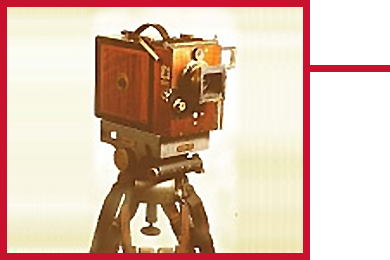
Le Parvo of Debrie camera, 1920s
established players of the day - began consolidating their operations into the Liuhe Film Company (Shanghai).The brothers soon found themselves shut out from the exhibition circuit belonging to the members of the cartel. This period is known in film history as the 'Liuhe encirclement'. With nowhere to show their films, the Shaw brothers began to look toward the growing South East Asia market as their land of opportunity.
The Hai Seng Company, Singapore
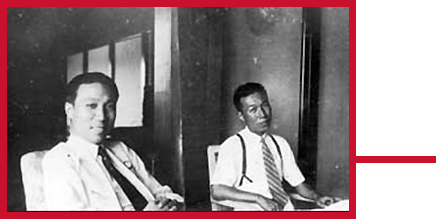
Orchard Road, Singapore 1925
Sir Run Run and Tan Sri Runme Shaw in their office
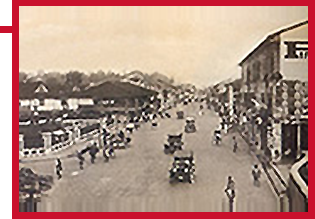
In Singapore, Runme and Run Run incorporated the Hai Seng Co (later Shaw Brothers Pte Ltd) in order to facilitate the distribution and exhibition of their movies. They handled not only films produced by themselves, but also acquired product from other chinese companies.
The company was run out of a single room office with two or three co-workers. This office, a wood and brick affair, was located on the ground floor of a two-and-a-half storey shop house on 116 Robinson Road. It was rented by Runme shortly before Run Run's arrival in Singapore.
From such a humble start, the business
The company was run out of a single room office with two or three co-workers. This office, a wood and brick affair, was located on the ground floor of a two-and-a-half storey shop house on 116 Robinson Road. It was rented by Runme shortly before Run Run's arrival in Singapore.
From such a humble start, the business
slowly expanded. Work was hard and it was not uncommon for the brothers to labour until 3 am in the morning. By the mid-30s, the brothers took over the entire shop house as their staff had grown to over 30. On the ground floor was the despatch and film storage area. The first floor housed the accounts and administrative departments. The second floor was the sitting room, kitchen, dining room and the boardroom where meetings were held. Above that, in a half-floor 'attic' was where Runme stayed before moving to a house at Chancery Lane. (Run Run stayed at a rented terrace house at Bideford Road before he stayed at a company house at Andrew Road).
Shortly before the war started, the brothers bought over their existing office building on 116 Robinson Road. They also took over three other adjoining shop house buildings and converted them into a single office block. As a result, some of the previous tenants of the acquired shop houses had to be relocated.
One of them was Lim Chong Pang (Sembawang rubber tycoon Lim Nee Soon's eldest son) who was then known as the 'cinema king' of Sembawang. He relocated his office to the Shaw-owned Capitol flats along Stamford and North Bridge Road. The Shaw office block would be eventually named Shaw Chambers.
One of them was Lim Chong Pang (Sembawang rubber tycoon Lim Nee Soon's eldest son) who was then known as the 'cinema king' of Sembawang. He relocated his office to the Shaw-owned Capitol flats along Stamford and North Bridge Road. The Shaw office block would be eventually named Shaw Chambers.
Next Story